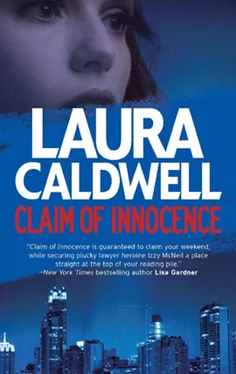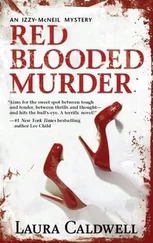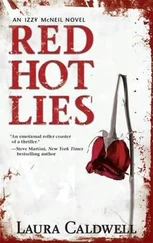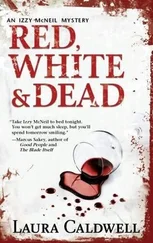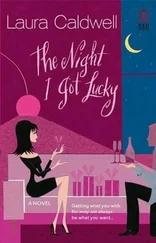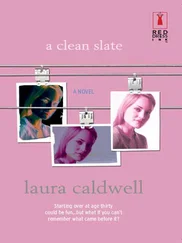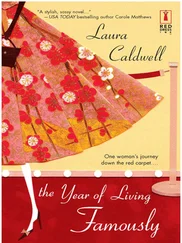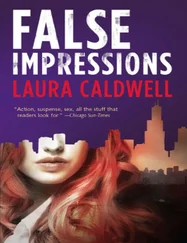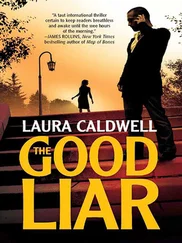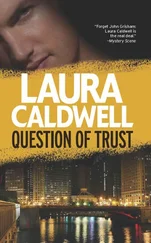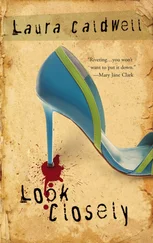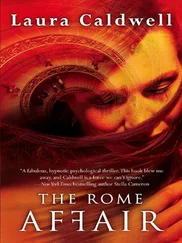Praise for Laura Caldwell’s IZZY MCNEIL novels
Red, White & Dead
“A sizzling roller coaster ride through the streets of Chicago, filled with murder, mystery, sex and heartbreak. These page-turners will have you breathless and panting for more.”
—Shore Magazine
“Chock full of suspense, Red, White & Dead is a riveting mystery of crime, love, and adventure at its best.”
—New York Times bestselling author Gayle Lynds
Red Blooded Murder
“Smart dialogue, captivating images, realistic settings and sexy characters… The pieces of the puzzle come together to reveal the secrets between the sheets that lead Izzy to realize who the killer is.”
—BookReporter.com
“Red Blooded Murder aims for the sweet spot between tough and tender, between thrills and thought—and hits the bull’s-eye. A terrific novel.”
—#1 New York Times bestselling author Lee Child
“Izzy is the whole package: feminine and sexy, but also smart, tough and resourceful. She’s no damsel-in-distress from a tawdry bodice ripper; she’s more than a fitting match for any bad guys foolish enough to take her on.”
—Chicago Sun-Times
Red Hot Lies
“Caldwell’s stylish, fast-paced writing grips you and won’t let you go.”
—Edgar Award–winning author David Ellis
“Told mainly from the heroine’s first-person point of view, this beautifully crafted and tightly written story is a fabulous read. It’s very difficult to put down—and the ending is terrific.”
—RT Book Reviews
“Former trial lawyer Caldwell launches a mystery series that weaves the emotional appeal of her chick-lit titles with the blinding speed of her thrillers… Readers will be left looking forward to another heart-pounding ride on Izzy’s silver Vespa.”
—Publishers Weekly
Claim Of Innocence
Laura Caldwell
www.mirabooks.co.uk
Chapter 1
Chapter 2
Chapter 3
Chapter 4
Chapter 5
Chapter 6
Chapter 7
Chapter 8
Chapter 9
Chapter 10
Chapter 11
Chapter 12
Chapter 13
Chapter 14
Chapter 15
Chapter 16
Chapter 17
Chapter 18
Chapter 19
Chapter 20
Chapter 21
Chapter 22
Chapter 23
Chapter 24
Chapter 25
Chapter 26
Chapter 27
Chapter 28
Chapter 29
Chapter 30
Chapter 31
Chapter 32
Chapter 33
Chapter 34
Chapter 35
Chapter 36
Chapter 37
Chapter 38
Chapter 39
Chapter 40
Chapter 41
Chapter 42
Chapter 43
Chapter 44
Chapter 45
Chapter 46
Chapter 47
Chapter 48
Chapter 49
Chapter 50
Chapter 51
Chapter 52
Chapter 53
Chapter 54
Chapter 55
Chapter 56
Chapter 57
Chapter 58
Chapter 59
Chapter 60
Chapter 61
Chapter 62
Chapter 63
Chapter 64
Chapter 65
Chapter 66
Chapter 67
Chapter 68
Chapter 69
Chapter 70
Chapter 71
Chapter 72
Chapter 73
Chapter 74
Chapter 75
Chapter 76
Chapter 77
Chapter 78
Chapter 79
Chapter 80
Chapter 81
Chapter 82
Chapter 83
Acknowledgments
“I zzy,” my friend Maggie said, “I need you to try this murder case with me. Now.”
“What?” I shifted my cell phone to my other ear, not sure I’d heard her right. I had never tried a criminal case before—not even a parking ticket, much less a murder trial.
“Yeah,” she said. “Right now.”
It was a hot August Thursday in Chicago, and I had just left the civil courthouse. I had taken three steps into the Daley Center Plaza, looked up at the massive Picasso sculpture—an odd copper thing that looked half bird, half dog—and I actually said to it, “I’m back.”
I’d argued against a Motion to Dismiss for Maggie. She normally wouldn’t have filed a civil case, but she’d done so as a favor to a relative. I lost the motion, something that would have burned me in days of yore, but instead I was triumphant. Having been out of the law for nearly a year, I’d wondered if I had lost it—lost the ability to argue, to analyze information second-to-second, to change course and make it look like you’d planned it all along. I had worried that perhaps not going to court was like not having sex for a while. At first, you missed it deeply but then it became more difficult to remember what it was like with each passing day. Not that I was having that particular problem.
But really, when I’d seen the burning sun glinting off the Picasso and I stated boldly that I was back in action, I meant it figuratively. I was riding off the fact that although Maggie’s opponent had won the motion, and the complaint temporarily dismissed, Judge Maddux had said, “Nice argument, counsel” to me, his wise, blue eyes sparkling.
Judge Maddux had seen every kind of case in his decades of practice and every kind of lawyer. His job involved watching people duke it out, day after day after day. For him to say “Nice argument” was a victory. It meant I still had it.
As I walked through the plaza, the heat curling my red hair into coils, I had called Maggie. She was about to pick a jury at 26th and Cal on a murder case, so her voice was rushed. “Jesus, I’m glad you called,” she said.
Normally, Maggie Bristol would not have answered her phone right before the start of a criminal trial, even if she was curious about the motion I’d handled for her. But she knew I was nervous to appear in court—something I used to do with such regularity the experience would have barely registered. She was answering, I thought, to see how I was doing.
“It went great!” I said.
I told her then that I was a “lawyer for hire.” Civil or criminal, I said, it didn’t matter. And though I’d only practiced civil before, I was willing to learn anything.
Since leaving the legal world a year ago, I’d tried many things—part-time assignments from a private investigator named John Mayburn and being a reporter for Trial TV, a legal network. I liked the TV gig until the lead newscaster, my friend Jane Augustine, was killed and I was suspected in her murder. By the time my name was cleared, I wasn’t interested in the spotlight anymore.
So the reporter thing hadn’t worked out, and the work with Mayburn was streaky. Plus, lately it was all surveillance, which was a complete snooze. “I miss the law,” I told Maggie from the plaza. “I want back in.”
Which was when she spoke those words—I need you to try this murder case with me. Now.
I glanced up at the Picasso once more, and I knew my world was about to change. Again.
O ver the years, it became disquieting—how easy the killing was, how clean.
He had always lived and worked in an antiseptic environment, distanced from the actual act of ending a life. They were usually killed in the middle of the night. But he never slept on those nights anyway, even though he wasn’t there. He twisted in his bed. The only way he knew when they were dead was when he got the phone call. The person on the line would state simply, “He’s gone.”
He would thank them, hang up and then he would go on, as if he hadn’t just killed someone.
But then he’d reached a point when he wanted to make it real. He wanted to see it.
And so he went to watch. He remembered that he had walked across the yard, toward the house. In the eerie, moonless night it seemed as if he heard a chorus of voices—formless cries, no words, just shouts and calls, echoes that sounded like pain itself.
Читать дальше
